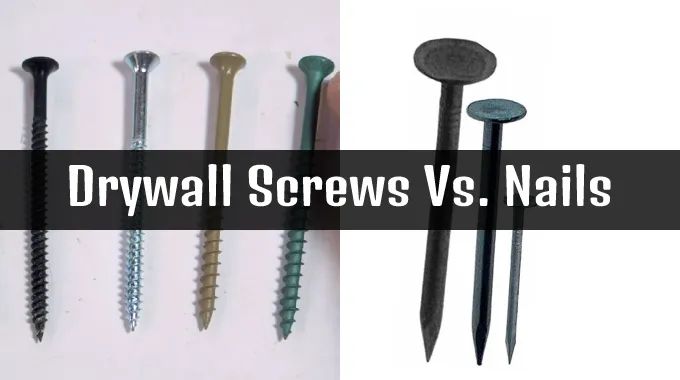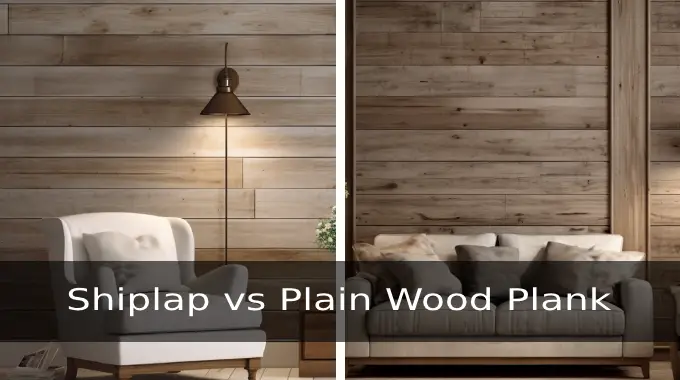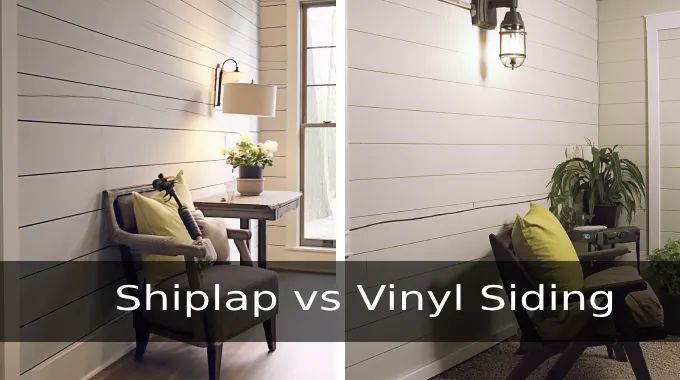Last Updated on February 7, 2023
A successful drywall job starts with the right fastener. Nails and screws have their place when it comes to attaching material but knowing which one should be used for a particular project is key to ensuring success.
Drywall screws and nails make it easy to tackle any drywalling job. Screws offer an advantage because their deep threads create a powerful grip that keeps them securely in place even with thicker boards.
On the other hand, if you’re doing a smaller project on a tight budget, then nails are your go-to choice since they come at a much lower price point. It’s all about your needs and budget.
We’ll explore the difference between drywall screws and nails, so you can decide which will work best for your needs. Let’s get started.
Comparison of Drywall Screws Vs Nails
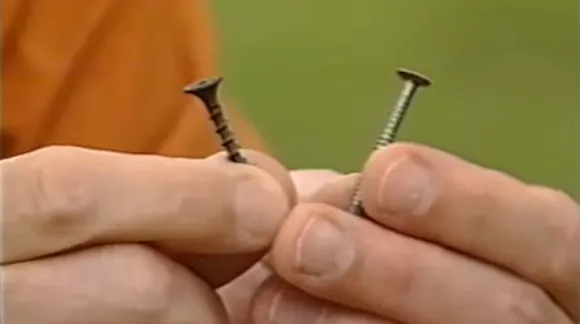
For installing drywall, contractors have several options, but drywall screws and drywall nails are two of the most popular. Both are needed for drywall installation, but they differ in a few ways, like:
Strength & Durability
Both drywall screws and nails offer a stronghold, but the type of fastener you choose will depend on the application. Generally speaking, drywall screws offer higher strength and durability than nails.
Because they have deeper threads that better penetrate wood or metal surfaces. They also have a larger diameter than nails, which gives them more surface area to grip the wallboard securely.
Additionally, drywall screws are less likely to “pop” out of the wall because they have a larger head that clamps down on the gypsum core when driven in. In contrast, nails can pop out if not inserted properly.
Product Cost
The cost of both drywall screws and nails can vary greatly depending on the type and size chosen. Generally speaking, drywall screws tend to be slightly more expensive than their nail counterparts due to their superior strength and durability.
However, when it comes to large projects such as entire walls or ceilings, the difference in cost between screws and nails can become negligible as saving just a few cents per screw or nail can quickly add up across an entire project.
Thus it’s important to consider both cost and quality when choosing which fastener to use.
Installation Cost
One of the major cost considerations when choosing between drywall screws and nails is the cost of labor for installation.
Drywall screws often require more time and effort to install than nails because each screw must be driven in with a drill or screw gun at an angle which takes more time than hammering in a nail.
Laborers are likely to charge more overall if they have been paid against the time they are spending on the job. However, choosing one based on cost alone may not make much difference overall.
Install Time
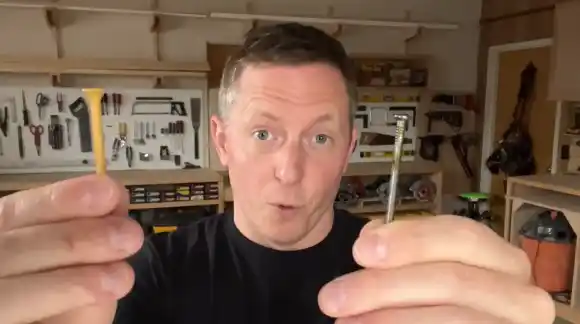
There can be significant differences in install time based on which type of fastener is used. Typically it will take longer to install drywall using screws since each screw must be pre-drilled into place before being driven in all the way.
This process requires precision and careful planning since each hole must be positioned exactly for maximum hold.
On the other hand, nails require no pre-drilling, so they can usually be driven in much faster, but this often results in a weaker bond since they don’t have any threading to grip the material securely.
The amount of time it takes to secure material with either type depends largely on the number of fasteners required and their placement.
For example, installing drywall screws is faster than nails when attaching large sheets as it eliminates having to measure for each fastener and hammer them individually as with nails.
Materials Used
It’s important to consider what kind of materials you will be attaching with either drywall screws or nails since not all materials are suitable for this type of application.
Drywall screws are designed specifically for use with gypsum board, while drywall nails can also be used with plywood and other materials such as furring strips or lath boards.
While harder materials like steel studs may require stronger fasteners such as structural self-tapping metal fasteners or masonry anchors if you want them to remain secure over time.
Nails may suffice for lightweight materials, but again this depends on how firmly you need them secured since heavier objects often require more durable fasteners for ultimate reliability.
Application Specifics
One should select between drywall screws and nails based on strength requirements and convenience factors like install time and ease of use.
A screw would likely be best if strength is critical, while a nail may work better due to its quick installation process.
Ceiling installations typically require extra care when affixing material so that it doesn’t shift over time, making screws a better choice than nails.
Ceiling Application
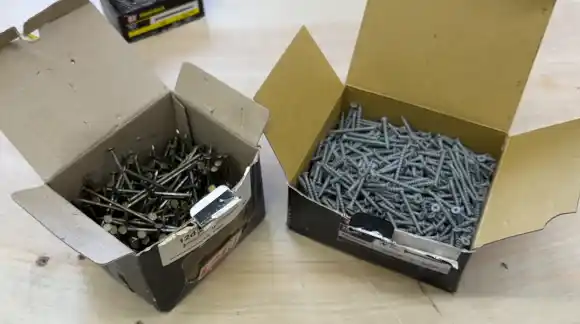
When it comes to ceiling applications, drywall screws are the superior choice over nails.
This is because the screws can hold more weight than nails due to their larger diameter and threading, making them the ideal fastener for heavier materials.
Additionally, they are easier to drive in and are less likely to dent or damage the drywall.
Metal Studs Application
Drywall screws create a tighter seal around metal studs, making them better at preventing wetness from seeping in and causing long-term damage.
Screws also provide greater stability, which helps ensure that any attached wall fixtures remain firmly fixed into place.
Frames Application
When it comes to framing applications, either nails or screws can be used depending on the situation.
Nails are typically preferred for smaller frames as they are quicker and easier to drive in than screws, while larger frames will benefit from extra support provided by a screw’s threading.
Ultimately, either should be sufficient for most framing projects since neither offers any major advantages.
Advantages Of Drywall Screws
Drywall screws offer increased strength compared to nails due to their deeper threads and larger heads.
Drywall screws provide a better grip over long-term usage, making them more suitable for heavy-duty applications.
Using drywall screws helps reduce wallboard damage from impacts caused by hammers used when driving in nails.
Advantages Of Nails
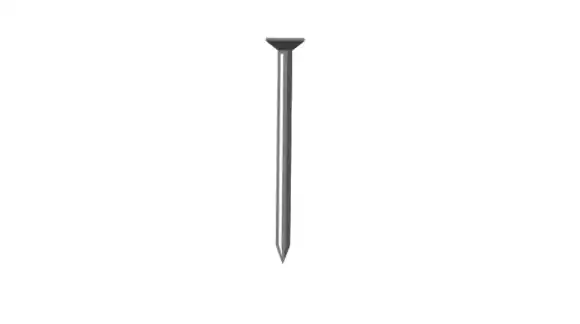
Despite being inferior in terms of strength compared to their screw counterparts, they do have some advantages. Most notably, convenience since no specialized tools like drills or screw guns are needed to simply hammer it in.
This also makes them great for quick repairs around the house since power tools aren’t always necessary, which makes them great options when completing small tasks like hanging pictures, frames, etc.
Additionally, they can provide good holding power when inserted correctly into wood surfaces, although extra caution needs to be taken here since they’re prone to popping out if too shallowly driven into wallboard material.
Can Drywall Screws or Nails Damage the Drywall?
Drywall screws and nails can potentially damage drywall. This is because installing them incorrectly or in an area that isn’t supported correctly can cause the screw or nail to put too much pressure on the drywall, resulting in the tearing or cracking of the sheetrock.
But if installed correctly with a proper-sized drill bit and appropriate anchors, they should not cause any harm to the drywall. When using nails, it is essential to use appropriately sized ones so they don’t punch right through the sheetrock.
For screws, it is important to make sure that they are driven into a stud or backer board for support, and it’s also a good idea to use self-tapping screws as they tend to reduce the splitting of the wood when inserting them.
Additionally, pre-drilling holes into the wall before driving in any fasteners can help prevent cracking or crumbling of the gypsum board.
Do Drywall Screws and Nails Come in Different Sizes for Different Drywall Thicknesses?
There are different sizes of drywall screws and nails depending on how thick the drywall is. Drywall screws come in two standard sizes: #6 and #8. The #6 size is typically used to attach drywall sheets to wood or metal studs, while the longer #8 size is often used to attach two pieces of drywall.
Nails also come in various sizes, including 1-inch and 1½-inch lengths. Nails should be long enough to penetrate the top layer of drywall and reach the underlying studs. Choose the right screw or nail length for your project to ensure a secure fit and prevent damage.
Why Do Carpenters Prefer Screws Instead Of Nails?
Carpenters often choose screws instead of nails for a number of reasons. First, screws provide more secure fastening due to their threaded design, which allows them to hold materials together with greater strength than nails.
Screws are easier to remove and replace if needed since the threads make them less likely to become stuck or break apart during disassembly.
In addition, screws come in a variety of sizes and lengths, allowing carpenters to customize their projects more easily than nails do. Finally, the head of a screw provides a flush surface that is easier to paint or stain over than a nail head.
Why Are Houses Framed With Nails, Not Screws?
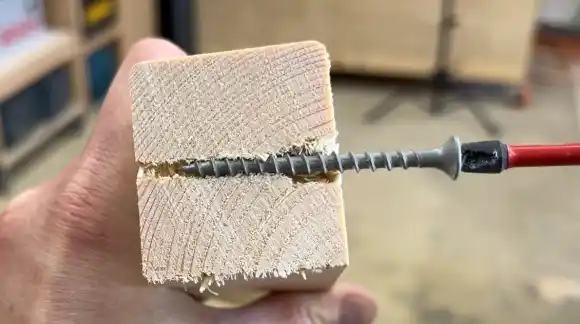
Houses are typically framed with nails because they allow for secure fastening between wood components without the need for additional hardware such as brackets or glue.
Nails also have higher tensile strength than wood screws, making them better suited for joining heavier-duty pieces of timber like floor joists and studs.
Furthermore, nailing offers greater flexibility regarding the spacing between boards than screwing; this makes it easier to adjust if you need to shift around two pieces of material during construction.
On top of that, nails are generally cheaper than screws and require less installation time and effort.
Can I Screw Directly Into The Drywall?
While it is possible to screw directly into drywall without the use of anchors, doing so is generally not recommended as it can cause damage to the wallboard over time due to its fragile nature and lack of structural integrity when used alone.
Instead, wall anchors should be used in order to provide extra support and prevent dislodging from occurring even under high amounts of strain or pressure.
Different types of anchors, such as plastic plugs or toggle bolts, can be used in accordance with the size/weight of the object being mounted as well as existing conditions within your home’s walls (e.g., whether studs are present).
Can You Put Screws In Drywall Without Anchors?
Yes, you can put screws in drywall without using anchors, provided that you select small enough screws which have sufficient grip strength for the item being mounted on your wall (e.g., light picture frames).
However, this method should only be utilized in cases where there is no risk of excessive weight or force being applied (as this could cause the screw heads to pull out).
It’s also important to keep in mind that while small screws may work initially, they may eventually loosen over time. Therefore, you should consider using anchors regardless if you want your fixtures or objects secured firmly long-term.
Do You Mud Over Screws In Drywall?
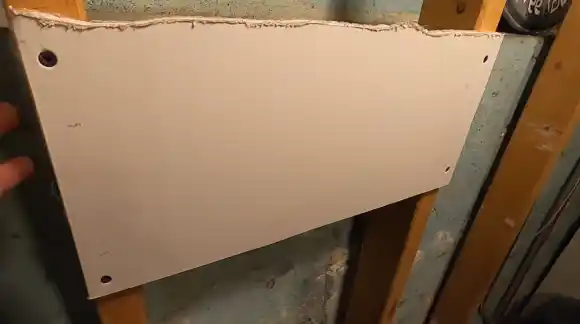
You should mud over each screw head when installing drywall rather than nails to fill in any gaps left behind. This helps create a smooth surface that will look more aesthetically pleasing once painted/finished.
Mud is applied by squeezing some onto each hole created by the screw before smoothing it out with a trowel.
This process should be repeated until all visible imperfections have been covered up completely before sanding down any excess material from around each hole afterward in order to ensure an even finish throughout your project area.
Drywall Screws or Nails: Choose the Right Option
Deciding between using drywall screws or nails should be based on your needs and budget constraints since each offers advantages depending on your plan.
While drywall screws offer an advantage with their powerful grip, drywall nails come at a lower price point, making them the ideal choice for smaller jobs.
You should, therefore, use drywall screws when the application is heavier-duty and drywall nails when the project is lighter and more budget-friendly. This way, you’ll be able to ensure the job is done correctly and securely.
